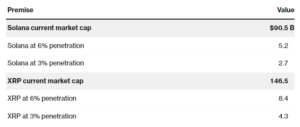In its latest report, “Technology Trends Outlook 2024,” McKinsey & Company includes blockchain as one of the significant technological advancements.
The report highlights blockchain’s transformative potential within the digital space and explores its role in tokenization.
Exploring the Potential of AI and Blockchain Intersection
The consulting firm closely links blockchain’s prominence to its report’s broader digital trust and cybersecurity theme. The real-life applications of artificial intelligence (AI) and blockchain are some of the points in McKinsey’s analysis.
While being analyzed separately, some points in the report hint at the potential for the intersection of AI and blockchain. For instance, blockchain could enhance AI’s capabilities by providing secure, transparent data storage and facilitating complex transactions. This synergy is evident in various applications, from AI-driven financial analytics to secure data sharing in healthcare.
Read more: AI in Finance: Top 8 Artificial Intelligence Use Cases for 2024
Moreover, integrating blockchain with generative AI technologies is driving innovation across industries. Companies like IBM are developing tools to mitigate AI risks, such as bias and privacy concerns, by leveraging blockchain’s secure infrastructure. This collaboration ensures that AI technologies can operate with greater transparency and accountability.
Nuro Serafim, Managing Partner at 3 Comma Capital, also supports the potential of AI and blockchain convergence. He added that the synergy between these technologies will notably impact the energy sector by optimizing smart grids.
“Nevertheless, there is a clear temptation for entrepreneurs to force an unrealistic convergence of these two technologies in the pursuit of capital matching the need for VC investors to be in the forefront of the advancements. Therefore, investors, namely professional investors, need to be armed with knowledge to filter and due diligence all this extra complexity,” Serafim explained to BeInCrypto.
From Pilot to Mainstream: Tokenization’s Journey to Financial Integration
Furthermore, the report highlights tokenization as one of the uses of real-life blockchains. Tokenization, which involves creating digital representations of real-world assets (RWAs) on a blockchain, is moving from pilot projects to widespread deployment.
McKinsey’s report observes how several financial giants are making key developments in this area. For instance, Citibank’s Citi Token Services converts clients’ deposits into digital tokens, enabling immediate cross-border payments and liquidity management.
Additionally, Franklin Templeton has leveraged public blockchains Stellar and Polygon to create its first tokenized US-registered mutual fund—Franklin OnChain US Government Money Fund (FOBXX). Similarly, Société Générale’s issuance of tokenized green bonds on the Ethereum network marks a significant milestone. These products have presented blockchain’s potential to revolutionize traditional financial instruments.
“Tokenization enhances transparency, composability, and programmability, enabling financial institutions to improve operational efficiencies, increase market liquidity, and create new revenue opportunities. […] Rising user awareness and investor demand will further accelerate this trend,” Matt Higginson, partner lead for McKinsey Values in Boston, said.
Read more: How Will Artificial Intelligence (AI) Transform Crypto?
While blockchain’s potential is immense, the report acknowledges the challenges associated with its adoption. These include integration with existing systems, regulatory uncertainties, and the need for strong cybersecurity measures. However, McKinsey emphasizes that organizations can overcome these hurdles with top-down leadership and strategic investments and fully capitalize on blockchain’s benefits.
The post McKinsey Spotlights Blockchain as a Top Tech Trend in 2024 appeared first on BeInCrypto.


